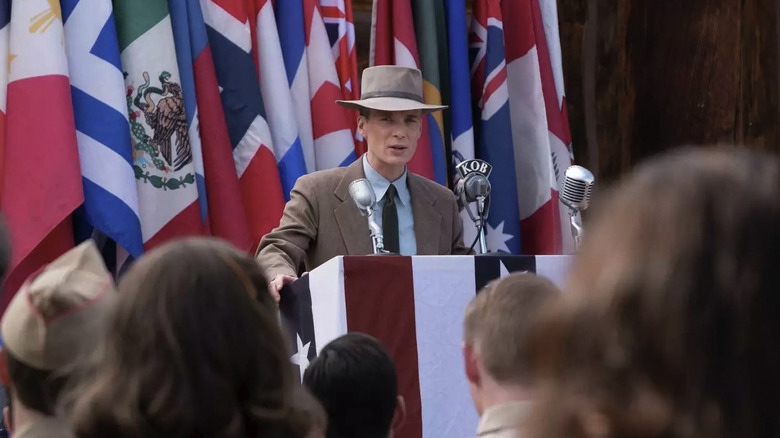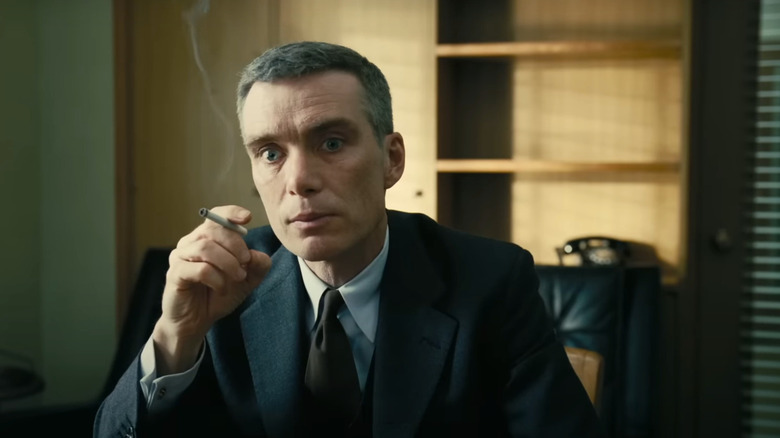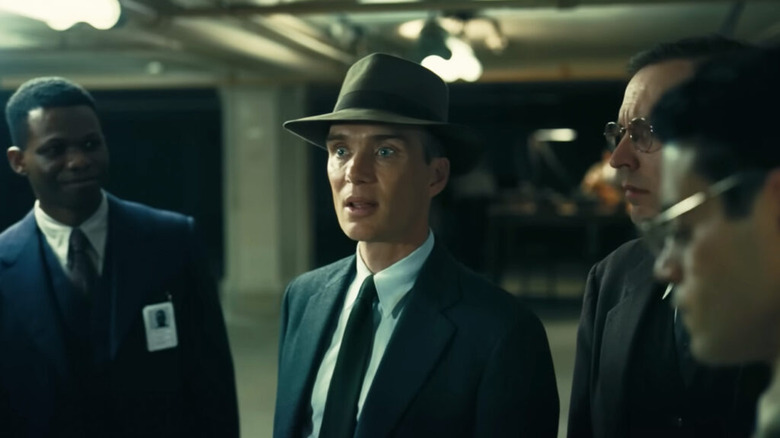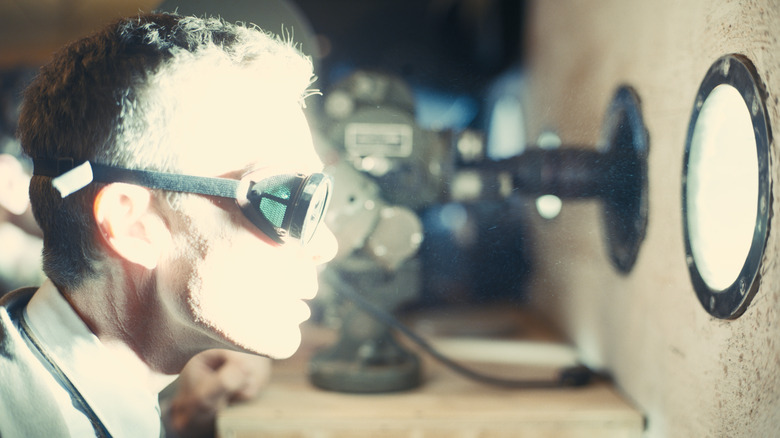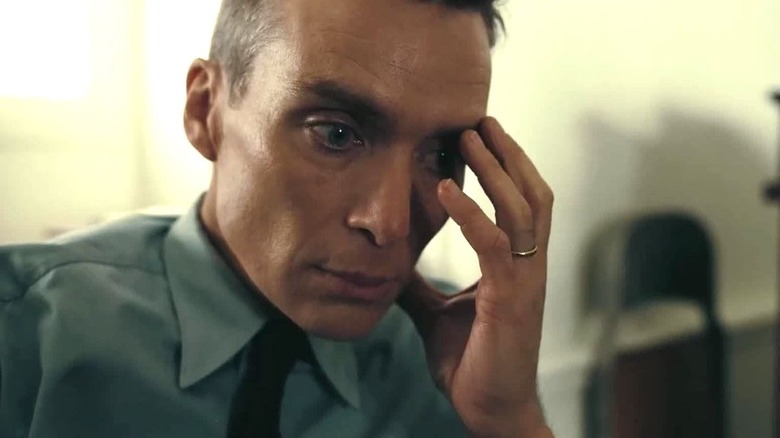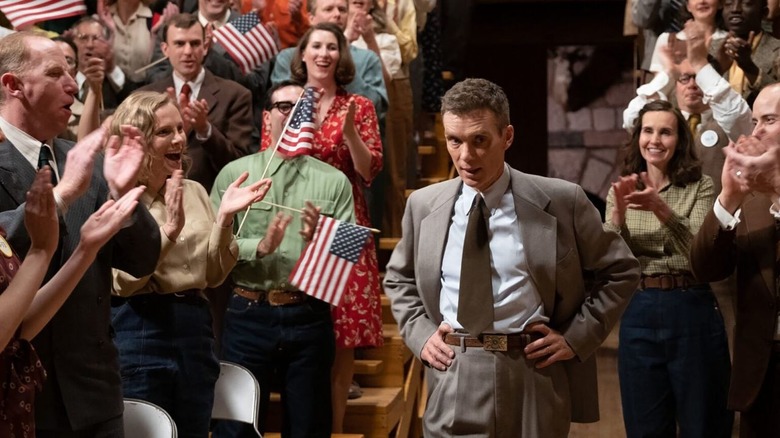Oppenheimer Editor Jennifer Lame On Focusing On Humanity Amid All The History [Exclusive Interview]
It's not quite reached a crisis point yet, but the way the art of editing is talked about online is approaching drastic levels of ignorance, with seemingly every social media pundit shouting cries of "bad editing" and "this could've had 20 minutes cut out of it" in conversations about film. Even when editing or an editor is praised, it's either because they're a well-established master of it (like Thelma Schoonmaker) or because the style of the film is deliberately show-y.
This is why it's been such a joy to see editor Jennifer Lame begin to get more street cred recently. Her style has been honed over the past decade and change, beginning with her collaboration with Noah Baumbach and continuing on through other auteur filmmakers like Ari Aster and, most recently, Christopher Nolan. In films like "Frances Ha," "Hereditary," and "Tenet," Lame has demonstrated a keen sense of rhythm, drama, and tension, making her name on a picture as much a mark of quality as that of the director's.
I had the opportunity to speak to Lame on the eve of the home release of Nolan's "Oppenheimer," a movie that would seem daunting to any layperson to cut together given its multiple timelines, huge ensemble of characters, and nuanced tone. During our interview, Lame told me about her ethos as a film editor, what her favorite scene in the film was (and why she had to cut it down), and how she almost passed on cutting "Hereditary."
Note: This interview has been lightly edited for clarity and brevity.
'I just wanted to make sure that everyone was along for the ride up until the very end'
"Oppenheimer" is such a remarkably paced film. It's chock full of information, visual and aural, but it never feels overstuffed. How did you help make that pacing happen, working with and opposite Christopher Nolan and also Ludwig Göransson and the sound design team? What was your role in that?
Yeah, I think pacing is one of those things. Obviously, every movie has to be well-paced, so it's such a funny thing to talk about. But I guess the reason why people want to keep talking about it with this film is because of the length, right? Because it covers so much stuff. I think for me, the pacing challenge of this movie was the length and the fact that it covered so much different material. From a huge historical event to a tiny weird rivalry between two people who were mad at each other, and then relationships that he had with his wife and that he had with Florence Pugh's character. So I just think, pacing-wise, the most important thing was that I never wanted it to feel jam-packed into three hours.
Chris and I wanted you to feel like you were just watching this entire life story get huge and then get tiny, and it had a lot of ups and downs and ebbs and flows. My favorite part of the movie is the last third part of the movie, thankfully. So for me, I just wanted people — I wanted, selfishly, everyone to feel that way. To me, the bomb going off is the least interesting part about the movie. To me, it's what happens after the bomb goes off. So, I think, pacing-wise, I just wanted to make sure that everyone was along for the ride up until the very end. One of my favorite scenes in the movie is when you get to see what Einstein said at the pond, and I wanted everyone to still be super engaged, so that when he was like, "You don't know what they were talking about" and we cut to Einstein, where it's like, "Whoa!" But everyone has to be engaged until then.
So I just think making that kind of rollercoaster ride of the version of the movie and making the ups and downs and letting people live in moments, and I keep talking about how I wanted the first 30 minutes of the movie to feel very digestible and you could understand all the characters. I wanted people to not feel pressure to understand all the timelines. I wanted it to feel like an emotional 30 minutes of information, but also that you were gaining a window into who all these people were. And not getting hunkered down in rules, or what was what.
But yeah, I think just that pacing question, as an editor, that's my whole job. People keep asking me that, and I totally understand why. And I also go back to when I first read the script, I had such a thrilling experience. I had to read it at Chris's house, I had to go talk to him right afterwards, and you go into this room and it's very sterile, and I just opened the page and next thing I knew, it was five minutes went by and I'd read the whole movie, and it was incredible. So I think my goal was to make sure that everyone felt that way when they saw the movie. Just screening it and screening it and being like, "Oh, this section is falling flat," or "This section, I feel like it doesn't have that same feeling of when I read that." I kept going back to that emotional initial reaction when I got to experience the movie for the first time for me, which is reading the script, and wanting that to come through for everybody else.
'I love human drama'
There's a remarkable amount of tension in the film, which is sustained over a long period of time. And there are obvious moments — the horrific victory speech, but also the hearing, and the courtroom sequences. Is it something that's in your mind, maintaining such a level of suspense, or is it something happening naturally throughout the drama?
I think it's kind of both. I think for me, and I talk a lot about this, is I love drama. I love human drama. It's kind of where I came up, working for Noah Baumbach for six years, who's a master at drama between people and making brilliant movies out of those little family moments and dramas. So I think for me, I think the human drama and the human elements, even when the stakes were super high — what I love about the Trinity sequence is all these young guys and how f***ing nervous they are. My favorite, there's so many lines, but when they're talking about the distance they are from the bomb and it's like, "I don't know. It's your calculation!" It feels like your friends in college talking about something, or in high school.
So I just think for me, humanizing everything and making the drama feel so relatable. That's what I love so much about this movie is I feel like there's so many ways in for different types of people to relate to any given sections of the movie.
Picking each character's best moments
There are so many characters with great actors playing these people, and each one seems to have their own moment. There's no one who feels wasted in terms of like, "Oh, they were there, but now they're gone." Was that a consideration working on this too, in terms of selecting takes or just moments of like, "Well, this is where Josh Hartnett really shines"?
Totally, totally. And I think that was something that was really important to Chris and I, it's something that we picked out really early on in the early screening, just smaller screenings we would have in the edit room of just people being like, "Wow, I really noticed this one scientist, even though he has one line. How'd you guys do that?" And then we were like, "We want to make sure we do that with all the scientists."
So yeah, even though some scientists just had one or two lines, making sure we saw their faces in certain scenes and making sure we cut to their faces in a scene that made sense for their personality. Some of them are funnier, like Kistiakowsky's really funny I find, and a little bit crazy. And the guy that pushes the button, I can't remember his name, but I know his face and he's the guy that has his hand over the red button. I feel like he's always looking a little nervous, but he's really f***ing reliable, but a little nervous. Just making sure their personalities come through, and the actors were all so great that they provided that for us. We just had to make sure that we cut to it when we could.
'You've got to get back on the Trinity train'
Nolan's not big on releasing deleted scenes for his films. Is he a lean filmmaker? Is there not a wealth of material?
No, there really isn't. I honestly cannot think of a single scene that we cut out completely. I think what we did is we would cut down scenes. And again, not because we felt like they needed to be cut down because we were cutting for time, but it was more like — for example, the [Boris] Pash sequence with Casey Affleck. That's one of my favorite sections of the movie. There's a really long version of that, my assembly that I love that I thought really funny and entertaining and great, but obviously we couldn't put that in the movie. Not because it was too long and we needed to cut down for time, but because pacing-wise, it comes at a point in the movie where you need to get on to it. Because we're getting really, really close to Trinity. And it kind of diverges in this really f***ing masterful way.
I think it's brilliant the way Chris takes that left turn right there as you're building up to the bomb, but you can only take that left turn for so long before people get off the train. [laughs] You've got to get back on the Trinity train. So yeah, I think it was, again, that was such difficult work to figure out, "How much can we go down this little road?" And it is really satisfying. When does it become not satisfying? That takes a lot of work. That was constant to the pacing question. Every time we cut down a scene, it was to make sure that we weren't going down a rabbit hole too far, but just enough that it was satisfying.
'I tried to get out of Hereditary'
I think cutting "Tenet" would've involved a huge amount of confusion. Was this movie easier in terms of there being these different timelines, different time periods? Was it more fluid?
I'll say a movie is as difficult or as hard as you make it, for my job. And also I really try not to take a movie that I don't think I can do a good job on. I talk about "Hereditary," Ari [Aster]. I tried to get out of "Hereditary," because I was like, "I don't know genre. I don't like modern day horror movies. I like old horror movies. I love Hitchcock and old suspenseful dramas, but I don't want to do this." Then he called me and he talked about Mike Leigh and his love of Mike Leigh and Bergman, and he loved "Manchester by the Sea" and he loves Kenny [Lonergan]. And I was like, "Oh." He's like, "I'm not trying to make a horror movie. I'm trying to make a great f***ing movie that happens to deal with horror, about a family that's f***ed up." And I was like, "Okay, I can do that."
To me, the most difficult movies and the easiest movies is how you find your way in. And I feel like because of my initial reading of the script, I just immediately knew, "Yeah, this is going to be hard, but it so satisfies all the tics of what I love about films." I think "Tenet" was a little bit harder for me because it was something that it was harder for me to grasp onto. I'm not a big action person. I've never really cut action. So yeah, I think "Tenet" was incredibly difficult for me on many levels. It was like my first leap into coming to California, coming to L.A., working on a bigger movie, working on an action movie, working with a director I'd never worked with before that I had an immense amount of respect for and was very intimidated by.
So "Tenet" was hard for me on so many levels, but I found my way in and that's what I did. But it just was so challenging, and I feel like what was great about this, my second film I got to do with Chris, is that I felt like I could bring a lot to this that I was already super comfortable with. And also I just loved the f***ing script. That doesn't happen that often, where you just are like, "Holy s***, this is amazing." That's obviously a testament to his writing. I mean, it's incredible.
"Oppenheimer" is available on 4K Ultra HD, Blu-ray, and Digital on November 21st.
